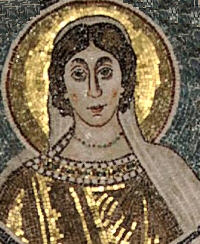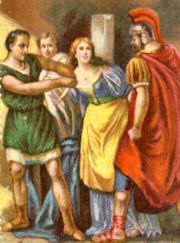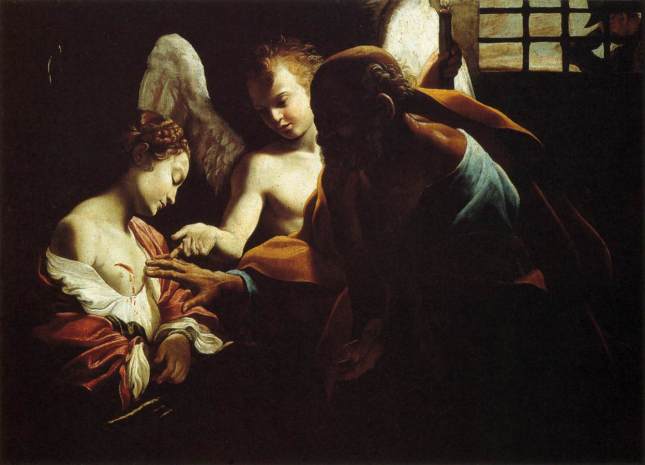21. And when Jesus was passed over again by ship to the other side, much people gathered to him: and He was nigh to the sea.
22. And, behold, there comes one of the rulers of the synagogue, Jairus by name; and when he saw him, he fell at his feet,
23. And besought him greatly, Saying, My little daughter lies at the point of death: I pray you, come and lay your hands on her, that she may be healed; and she shall live.
24. And Jesus went with him; and much people followed him, and thronged him.
25. And a certain woman, which had an issue of blood twelve years,
26. And had suffered many things of many physicians, and had spent all that she had, and was nothing bettered, but rather grew worse,
27. When she had heard of Jesus, came in the press behind, and touched his garment.
28. For she said, If I may touch but his clothes, I shall be whole.
29. And straightway the fountain of her blood was dried up; and she felt in her body that she was healed of that plague.
30. And Jesus, immediately knowing in himself that virtue had gone out of him, turned him about in the press, and said, Who touched my clothes?
31. And his disciples said to him, You see the multitude thronging you, and say you, Who touched me?
32. And he looked round about to see her that had done this thing.
33. But the woman fearing and trembling, knowing what was done in her, came and fell down before him, and told him all the truth.
34. And he said to her, Daughter, your faith has made you whole; go in peace, and be whole of your plague.
THEOPHYL. After the miracle of the demoniac, the Lord works another miracle, namely, in raising up the daughter of the ruler of the synagogue; the Evangelist, before narrating this miracle, says, And when Jesus was passed over again by ship to the other side, much people gathered to him.
AUG. But we must understand, that what is added of the daughter of the ruler of the synagogue, took place when Jesus had again crossed the sea in a ship, though how long after does not appear; for if there were not an interval, there could be no time for the taking place of that which Matthew relates, concerning the feast at his own house; after which event, nothing follows immediately, except this concerning the daughter of the chief of the synagogue. For he has so put it together, that the transition itself shows that the narrative follows the order of time. It goes on, There comes one of the rulers of the synagogue, &c.
PSEUD-CHRYS. He has recorded the name on account of the Jews of that time, that it might mark the miracle. It goes on, And when he saw him, he fell at his feet, and besought him greatly, &c. Matthew indeed relates that the chief of the synagogue reported that his daughter was dead, but Mark says that she was very sick, and that afterwards it was told to the ruler of the synagogue, when our Lord was about to go with him, that she was dead. The fact then, which Matthew implies, is the same, namely, that He raised her from the dead; and it is for the sake of brevity, that he says that she was dead, which was evident from her being raised.
AUG. For he attaches himself not to the words of the father, but to what is of most importance, his wishes; for he was in such despair, that his wish was that she should return to life, not thinking that she could be found alive, whom he had left dying.
THEOPHYL. Now this man was faithful in part, inasmuch as he fell at the feet of Jesus, but in that he begged of Him to come, he did not show as much faith as lie ought. For he ought to have said, Speak the word only, and my daughter shall be healed. There follows, And he went away with him, and much people followed him, and thronged him; and a woman, which had an issue of blood twelve years, &c.
CHRYS. This woman, who was celebrated and known to all, did not dare to approach the Savior openly, nor to come to Him, because, according to the law, she was unclean; for this reason she touched Him behind, and not in front, for that she dare not do, but only ventured to touch the hem of His garment. It was not however the hem of the garment, but her frame of mind that made her whole.
There follows, For she said, If I may but touch his clothes, I shall be whole.
THEOPHYL. Most faithful indeed is this woman, who hoped for healing from His garments. For which reason she obtains health; wherefore it goes on, And straightway the fountain of her blood was dried up, and she felt in her body that she was healed.
PSEUD-CHRYS. Now the virtues of Christ are by His own will imparted to those men, who touch Him by faith. Wherefore there follows, And Jesus, immediately knowing in himself that virtue had gone out of him, turned him about in the press, and said, who touched my clothes? The virtues indeed of the Savior do not go out of Him locally or corporally, nor in any respect pass away from Him. For being incorporeal, they go forth to others and are given to others; they are not however separated from Him, from whom they are said to go forth, in the same way as sciences are given by the teacher to his pupils. Therefore it says, Jesus, knowing in himself the virtue which had gone out of him, to show that with His knowledge, and not without His being aware of it, the woman was healed.
But He asked, Who touched me? although He knew her who touched Him, that He might bring to light the woman, by her coming forward, and proclaim her faith, and lest the virtue of His miraculous work should he consigned to oblivion. It goes on, And his disciples said to him, You see the multitude thronging you, and say you, Who touched me? But the Lord asked, Who touched me, that is in thought and faith, for the crowds who throng Me cannot be said to touch Me, for they do not come near to Me in thought and in faith.
There follows, And he looked round about to see her that had done this thing.
THEOPHYL. For the Lord wished to declare the woman, first to give His approbation to her faith, secondly to urge the chief of the synagogue to a confident hope that He could thus cure his child, and also to free the woman from fear. For the woman feared because she had stolen health; wherefore there follows, But the woman fearing and trembling, &c.
BEDE; Observe that the object of His question was that the woman should confess the truth of her long want of faith, of her sudden belief and healing, and so herself be confirmed in faith, and afford an example to others. But he said to her, Daughter, your faith has made you whole; go in peace, and be whole of your plague. He said not, Your faith is about to make you whole, but has made you whole, that is, in that you have believed, you have already been made whole.
CHRYS. He calls her daughter because she was saved by her faith; for faith in Christ makes us His children.
THEOPHYL. But He said to her, Go in peace, that is, in rest, which means, go and have rest, for up to this time you have been in pains and torture
PSEUD-CHRYS. Or else He says, Go in peace, sending her away into that which is the final good, for God dwells in peace, that you may know, that she was not only healed in body but also from the causes of bodily pain, that is, from her sins
PSEUDO-JEROME. Mystically, however, Jairus comes after the healing of the woman, because when the fullness of the Gentiles has come in, then shall Israel be saved. Jairus means either illuminating, or illuminated, that is, the Jewish people having cast off the shadow of the letter, enlightened by the Spirit and enlightening others, falling at the feet of the Word that is humbling itself before the Incarnation of Christ, prays for her daughter, for when a man lives himself, he makes others live also. Thus Abraham, and Moses, and Samuel, intercede for the people who are dead, and Jesus comes upon their prayers.
BEDE; Again, the Lord going to the child, who is to be healed, is thronged by the crowd, because though He gave healthful advice to the Jewish nation, he is oppressed by the wicked habits of that carnal people; but the woman with an issue of blood, cured by the Lord, is the Church gathered together from the nations, for the issue of blood may be either understood of the pollution of idolatry, or of those deeds, which are accompanied by pleasure to flesh and blood. But whilst the word of the Lord decreed salvation to Judea, the people of the Gentiles by an assured hope seized upon the health, promised and prepared for others.
THEOPHYL. Or else, by the woman, who had a bloody flux, understand human nature; for sin rushed in upon it, which since it killed the soul, might be said to spill its blood. It could not be cured by many physicians, that is, by the wise men of this world, and of the Law and the Prophets; but the moment that it touched the hem of Christ's garment, that is, His flesh, it was healed, for whoever believes the Son of man to be Incarnate is he who touches the hem of His garment.
BEDE; Wherefore one believing woman touches the Lord, whilst the crowd throngs Him, because He, who is grieved by divers heresies, or by wicked habits, is worshipped faithfully with the heart of the Catholic Church alone. But the Church of the Gentiles came behind Him; because though it did not see the Lord present in time flesh, for the mysteries of His Incarnation had been gone through, yet it attained to the grace of His faith, and so when by partaking of His sacraments, it merited salvation from its sins, as it were the fountain of its blood was dried up by the touch of His garments. And the Lord looked round about to see her who had done this, because He judges that all who deserve to be saved are worthy of His look and of His pity.
35. While he yet spoke, there came from the ruler of the synagogue's house certain which said, Your daughter is dead: why trouble you the Master any further?
36. As soon as Jesus heard the word that was spoken, he said to the ruler of the synagogue, Be not afraid, only believe.
37. And he suffered no man to follow him, save Peter, and James, and John the brother of James.
38. And he comes to the house of the ruler of the synagogue, and sees the tumult, and them that wept and wailed greatly.
39. And when he was come in, he said to them, Why make you this ado, and weep? the damsel is not dead, but sleeps.
40. And they laughed him to scorn. But when he had put them all out, he takes the father and the mother of the damsel, and them that were with him, and enter in where the damsel was lying.
41. And he took the damsel by the by and, and said unto her, Talitha cumi; which is, being interpreted, Damsel, I say to you, arise.
42. And straightway the damsel arose, and walked; for she was of the age of twelve years. And they were astonished with a great astonishment.
43. And he charged them straitly that no man should know it; and commanded that something should be given her to eat.
THEOPHYL. Those who were about the ruler of the synagogue, thought that Christ was one of the prophets, and for this reason they thought that they should beg of Him to come and pray over the damsel. But because she had already expired, they thought that He ought not to be asked to do so. Therefore it is said, While he yet spoke, there came messengers to the ruler of the synagogue, which said, Your daughter is dead; why trouble you the Master any further?
But the Lord Himself persuades the father to have confidence. For it goes on, As soon as Jesus heard the word which was spoken, he said to the ruler of the synagogue, Be not afraid; only believe.
AUG. It is not said that he assented to his friends who brought the tidings and wished to prevent the Master from coming, so that our Lord's saying, Fear not, only believe, is not a rebuke for his want of faith, but was intended to strengthen the belief which he had already. But if the Evangelist had related, that the ruler of the synagogue joined the friends who came from his house, in saying that Jesus should not be troubled, the words which Matthew relates him to have said, namely, that the damsel was dead, would then have been contrary to what was in his mind.
It goes on, And he suffered no man to follow him, save Peter, and James, and John the brother of James.
THEOPHYL. For Christ in His lowliness would not do any thing for display. It goes on, And he comes to the house of the ruler of the synagogue, and sees the tumult, and them that wept and wailed greatly.
PSEUD-CHRYS. But He Himself commands them not to wail, as if the damsel was not dead, but sleeping; wherefore it says, And when he was come in, he said to them, Why make you this ado, and weep? the damsel is not dead, but sleeps.
PSEUDO-JEROME; It was told the ruler of the synagogue, Your daughter is dead. But Jesus said to him, She is not dead, but sleeps. Both are true, for the meaning is, She is dead to you, but to Me she is asleep.
BEDE; For to men she was dead, who were unable to raise her up; but to God she was asleep, in whose purpose both the soul was living, and the flesh was resting, to raise again. Whence it became a custom amongst Christians, that the dead, who, they doubt not, will rise again, should be said to sleep. It goes on, And they laughed him to scorn.
THEOPHYL. But they laugh at Him, as if unable to do anything farther; and in this He convicts them of bearing witness involuntarily, that she was really dead whom He raised up, and therefore, that it would be a miracle if He raised her.
BEDE; Because they chose rather to laugh at than to believe in this saying concerning her resurrection, they are deservedly excluded from the place, as unworthy to witness His power in raising her, and the mystery of her rising; wherefore it goes on, But when he had put them all out, he takes the father and the mother of the damsel, and them that were with him, and enters in where the damsel was lying.
CHRYS. Or else, to take away all display, He suffered not all to he with Him; that, however He might leave behind Him witnesses of His divine power, He chose His three chief disciples and the father and mother of the damsel, as being necessary above all. And He restores life to the damsel both by His hand, and by word of mouth. Wherefore it says, And he took the damsel by the hand, and said unto her, Talitha cumi; which is, being interpreted, Damsel, I say unto you, Arise.
For the hand of Jesus, having a quickening power, quickens the dead body, and His voice raises her as she is lying; wherefore it follows, And straightway the damsel arose and walked.
JEROME; Some one may accuse the Evangelist of a falsehood in his explanation, in that he has added, I say to you, when in Hebrew, Talitha cumi only means, Damsel, arise; but He adds, I say unto thee, Arise, to express that His meaning was to call and command her. It goes on, For she was of the age of twelve years.
GLOSS. The Evangelist added this, to show that she was of an age to walk. By her walking she is shown to have been not only raised up but also perfectly cured. It continues, And they were astonished with a great astonishment.
CHRYS. To show that He had raised her really, and not only to the eve of fancy
BEDE; Mystically; the woman was cured of a bloody flux, and immediately after the daughter of the ruler of the synagogue is reported to be dead, because as soon as the Church of the Gentiles is washed from the stain of vice, and called daughter by the merits of her faith, at once the synagogue is broken up on account of its zealous treachery and envy; treachery, because it did not choose to believe in Christ; envy, because it was vexed at the faith of the Church. What the messengers told the ruler of the synagogue, Why trouble you the Master anymore, is said by those in this day who, seeing the state of the synagogue, deserted by God, believe that it cannot be restored, and therefore think that we are not to pray that it should he restored. But if the ruler of the synagogue, that is, the assembly of the teachers of the Law, determine to believe, the synagogue also, which is subjected to them, will be saved.
Further, because the synagogue lost the joy of having Christ to dwell in it, as its faithlessness deserved, it lies dead as it were, amongst persons weeping and wailing. Again, our Lord raised the damsel by taking hold of her hand, because the hands of the Jews, which are full of blood, must first be cleansed, else the synagogue, which is dead, cannot rise again. But in the woman with the bloody flux, and the raising of the damsel, is shown the salvation of the human race, which was so ordered by the Lord, that first some from Judea, then the fullness of the Gentiles, might come in, and so all Israel might be saved. Again, the damsel was twelve years old, and the woman had suffered for twelve years, because the sinning of unbelievers was contemporary with the beginning of the faith of believers; wherefore it is said, Abraham believed on God, and it was counted to him for righteousness.
GREG. Morally again, our Redeemer raised the damsel in the house, the young man without the gate, Lazarus in the tomb; he still lies dead in the house, whose sin is concealed; he is carried without the gate, whose sin has broken forth into the madness of an open deed; he lies crushed under the mound of the tomb, who in the commission of sin, lies powerless beneath the weight of habit.
BEDE; And we may remark, that lighter and daily errors may he cured by the remedy of a lighter penance. Wherefore the Lord raises the damsel, lying in the inner chamber with a very easy cry, saying, Damsel, arise; but that he who had been four days dead might quit the prison of the tomb, he groaned in spirit, He was troubled, He shed tears. In proportion, then, as the death of the soul presses the more heavily, so much the more ardently must the fervor of the penitent press forward. But this too must be observed, that a public crime requires a public reparation; wherefore Lazarus, when called from the sepulcher, was placed before the eyes of the people: but slight sins require to be washed out by a secret penance, wherefore the damsel lying in the house is raised up before few witnesses, and those are desired to tell no man. The crowd also is cast out before the damsel is raised; for if a crowd of worldly thoughts be not first cast out from the hidden parts of the heart, the soul, which lies dead within, cannot rise. Well too did she arise and walk, for the soul, raised from sin, ought not only to rise from the filth of its crimes, but also to make advances in good works, and soon it is necessary that it should be filled with heavenly bread, that at is, made partaker of the Divine Word, and of the Altar.
Catena Aurea Mark 5


 Returning to prison, she prayed: "You have seen, O Lord, my struggle, how I fought in the place of combat; but because I would not obey the commands of rulers, my breasts were lacerated." In the night there appeared to her a venerable old man, the apostle Peter, with healing remedies. Agatha, ever delicately modest, hesitated to show him her wounds. "I am the apostle of Christ; distrust me not, my daughter." To which she replied: "I have never used earthly medicines on my body. I cling to the Lord Jesus Christ, who renews all things by His word." She was miraculously healed by St. Peter: "Father of my Lord Jesus Christ, I give you praise because by Your apostle You have restored my breasts." Throughout the night a light illumined the dungeon. When the guards fled in terror, her fellow prisoners urged her to escape but she refused: "Having received help from the Lord, I will persevere in confessing Him who healed me and comforted me."
Returning to prison, she prayed: "You have seen, O Lord, my struggle, how I fought in the place of combat; but because I would not obey the commands of rulers, my breasts were lacerated." In the night there appeared to her a venerable old man, the apostle Peter, with healing remedies. Agatha, ever delicately modest, hesitated to show him her wounds. "I am the apostle of Christ; distrust me not, my daughter." To which she replied: "I have never used earthly medicines on my body. I cling to the Lord Jesus Christ, who renews all things by His word." She was miraculously healed by St. Peter: "Father of my Lord Jesus Christ, I give you praise because by Your apostle You have restored my breasts." Throughout the night a light illumined the dungeon. When the guards fled in terror, her fellow prisoners urged her to escape but she refused: "Having received help from the Lord, I will persevere in confessing Him who healed me and comforted me." 



